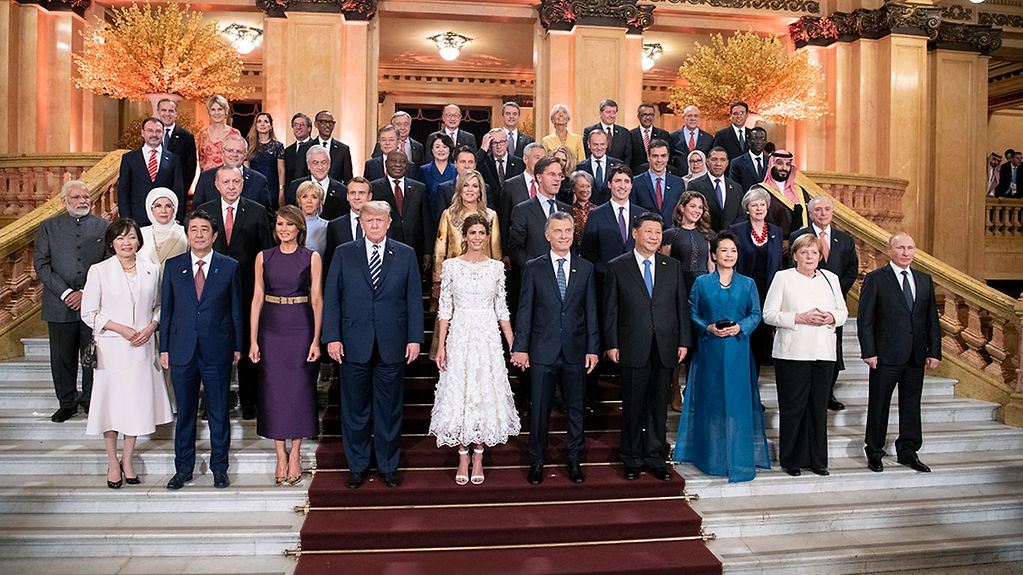G20 summit in Buenos Aires
The G20 heads of state and government have agreed on a Leaders’ Declaration. Thanks to constructive cooperation and the readiness to compromise, important steps had been taken on world trade and the climate, said Angela Merkel on the fringe of the summit in Buenos Aires.

Traditional family photo: G20 leaders in Buenos Aires
Photo: Bundesregierung/Bergmann
The heads of state and government at the G20 summit in Argentina agreed to push ahead with reforming the World Trade Organization (WTO), to make it possible to better respect the common rules of play.
The summit is also sending a "clear message – at least from most of us – for a successful COP24 in terms of climate change", said Chancellor Angela Merkel. Germany is to double its contribution to climate financing, the Chancellor reaffirmed at the summit.
The UN Climate Change Conference (COP24) begins on 3 December in the Polish city of Katowice.
Argentina continues the German initiatives
The Chancellor expressly praised the role of Argentina, this year’s host nation. The country supports multilateralism and a rules-based world trade order. Argentina, she added, has continued important topics raised during Germany’s Presidency, and sent other clear messages.
In this context she singled out for special mention the initiatives for Africa and actions to improve global health and empower women. Japan, which is to take over the G20 presidency next year intends to pursue these topics enthusiastically, said the Chancellor.
The G20 member states are: the USA, China, Japan, Germany, France Brazil, the United Kingdom, Italy, Russia Canada, India, Australia, Mexico, South Korea, Indonesia, Turkey, Saudi Arabia, Argentina and South Africa. The European Union is also part of the G20 where it represents the other EU member states. Spain is a permanent guest invitee. Representatives of Chile, Jamaica, the Netherlands, Rwanda, Senegal and Singapore were also invited to attend the 2018 G20 summit.
Bilateral meetings on the sidelines of the summit
Traditionally, a summit of this sort also provides an opportunity for bilateral meetings. At the start of the second day of the summit, Angela Merkel met with Russian President Vladimir Putin. Their talks focused on the situation in Syria and the situation between Russia and Ukraine in the Kerch Strait and the Sea of Azov.
On Syria, they both reaffirmed the agreements reached at the four-way summit in Istanbul and agreed that more work was needed to implement this on the road to a political process.
The Chancellor once again expressed her concern about the escalation in the Kerch Strait and clearly stated her support for freedom of navigation in the Sea of Azov. She agreed with the Russian President that more talks should be held at advisor level within the Normandy group.
With President Donald Trump, Angela Merkel also discussed the tensions between Ukraine and Russia, over shipping in the Kerch Strait.
They discussed the USA’s announcement that it intends to leave the INF agreement, and the next steps on the US side in this connection.
Angela Merkel also had bilateral meetings with the Chinese President Xi Jinping, the Indian Prime Minister Narenda Modi and the Australian Prime Minister Scott Morrison.








